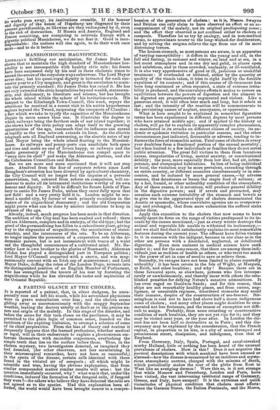MANSIONHOIJSE MAGNIFICENCE.
LITERALLY fulfilling our anticipation, Sir James Duke has shown that to maintain the high standard of Mansionhouse hos- pitality is not incompatible with healthy civic rule: his feasts have been surpassed only by his zeal in these choleraic times to amend the errors of the corporate ways subterrene. The Lord Mayor never dies; but his quasi-regal dignity is intrusted for each suc- cessive year to a City magnate, and great is the emulation to main- tain the princely standard: Sir James Duke has raised it. He has not only extended the civic hospitalities beyond wealth, statesman- ship, and diplomacy, to literature and science, but has brought the whole island within the sphere of his invitation-cards. His banquet to the Edinburgh Town-Council, this week, repays the attentions he received in a recent visit to his native hyperborean
ions beyond the Tweed, surpassing the conquests of Claudius : a act which we take to typify the capacities of the Mansionhouse Dogate in more senses than one. It illustrates the degree to which railways bring the furthest ends of our island together; it also shows how the civic policy can adapt itself to the growing opportunities of the age, insomuch that its influence can spread as rapidly as the iron network extends its lines. As the electric telegraph sets all England conversing, so the electric notes of my Lord Mayor bring the whole island feasting to the Mansion- house. As railways and penny-posts can annihilate both space and time and make no end of lovers happy, so railways and the elastic generosity of the Mansionhouse can compel space to "creep into its shell" and make the Aldermen glorious, and eke • the Caledonian Councillors and. Bailies.
But we are more and more convinced that it will not stop there. Absolved from the fear of corporate reform since Lord Brougham's attention has been diverted by agricultural chemistry, the City Council will no longer feel the impulse of a perverse conservatism, but, released from reform on compulsion, will en- deavour to make all its intramural institutions worthy of its own honour and dignity. It will be difficult for future Lords of Fins- bury to outdo Sir James Duke, unless they enter fully upon that new field : and a very pretty field it is. London might be ren- dered a model city, by favour of such princely emulation in the leaders of its oligarchical democracy ; and the old Corporation might prove what can be done by ancient institutions to keep in advance of the age. Already, indeed, much progress has been made in that direction. The ambition of the City soul has been exalted and refined : there still are Aldermen, complete and in embryo, of the old. type ; but the greed of the gormandizing has fallen to a subordinate place, giving way to the elegancies of magnificence, the associations of states- manship, and the intercourse of the arts. To be an Alderman, no longer implies the possession of a corporation sole in the AI- dermanic person but is not inconsistent with traces of a waist and the thoughtful countenance of a cultivated mind. Mr. Re- corder Law is own brother to the glories of Somnauth ; Alderman Cobden has played a distinguished part in European politics ; Lord Mayor O'Connell coquetted with a crown, and was mag- nanimously content with an Irish cap of maintenance ; and Lord Mayor Duke, doffing the robes of the London Doge, retreats into the distinguished position of an English Member of Parliament, who has strengthened the tenure of his seat by fostering the magnificence while he has elevated the tastes and aspirations of the Oriental Republic.
























 Previous page
Previous page